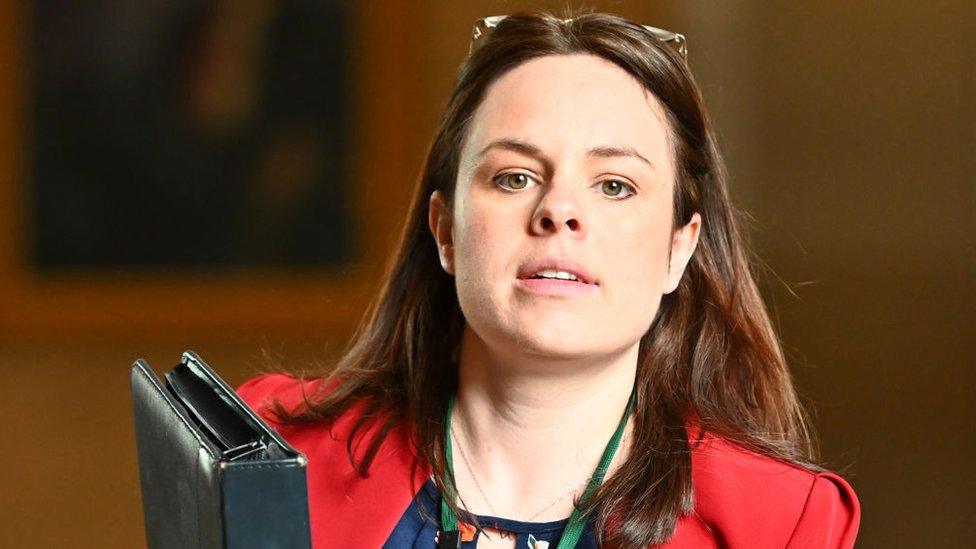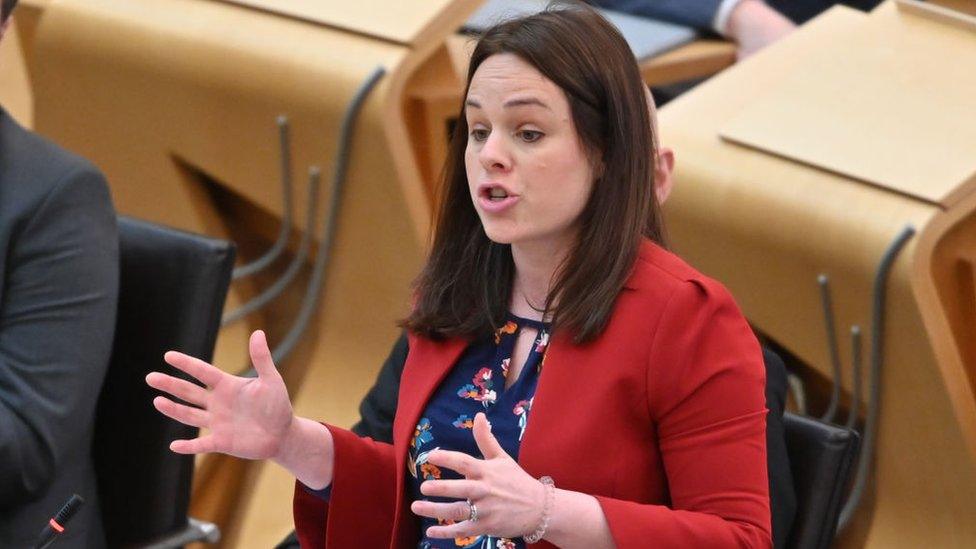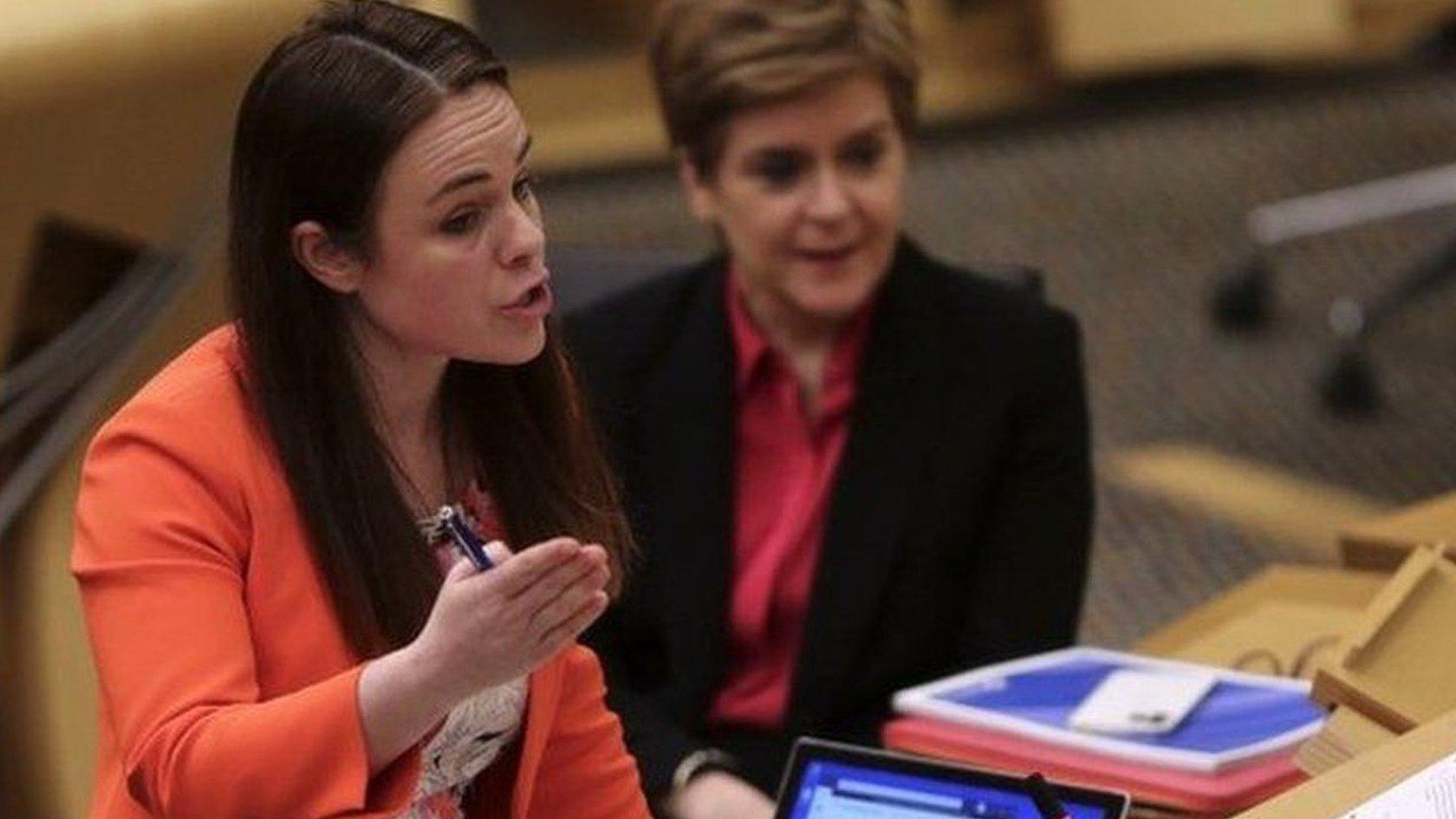Spending Review: Difficult choices bring public service change
- Published

Finance Secretary Kate Forbes delivered the Scottish government's spending review at Holyrood
Holyrood had a reality check with the latest flurry of publications - with a reminder of simple rules about spending priorities
Ministers are piling extra money into welfare benefits, to make a political point over Westminster, but it comes at a substantial cost to many other public services
Helping the major areas of spending that are seeing real terms cuts has brought out the file marked "reforms" - tried before, and now being applied under financial pressure. That points to particular tensions with local councils.
It's a simple enough notion when you're handling a budget: spend a pound on one thing, and it's not there for you to spend on another.
So if you prioritise one area in a constrained budget, then other areas have to be pared back.
Simple, yes, but not always appreciated at Holyrood, where the rhetoric has sometimes made it seem there would always be money somewhere to do things better and more generously than the rest of the UK.
Kate Forbes on Tuesday offered familiar rhetoric about Westminster's alleged failures to deliver what was needed, and the lack of powers for Scots to make their own decisions.
But underlying the finance secretary's words were documents, charts and tables that should give MSPs a more honest and bracing lesson in budgeting than any I recall.
The Scottish Fiscal Commission offered the more blunt messages, external: we may not hit recession this year, with 2.1% growth. Inflation is forecast to be at 8.5% at the end of the year - a forecast set last month before we learned it was already at 9%. Employment will fall, but there's no sign of catastrophe to come.
However, growth is going to be slow for the foreseeable future, at only around 1% per year. Real earnings are going to take a bigger dip than the rest of the UK - down 2.7%, it forecast for this year. And they're not going to come back strongly.
Therefore, income tax revenues are not going to provide the funds for all Holyrood's ambitions. And over-cooked estimates of the tax base and income tax returns are now showing up as very expensive corrections in subsequent years, in one year alone taking an £800m chunk out of revenue.
Welfare trumps health
What became clear from such publications was that choices made to show how much more generous Holyrood can be on welfare payments is having a direct effect on other spending.
The fiscal commission reckons Holyrood is already spending £500m more on welfare this year than it receives in lieu of the benefits Westminster is no longer distributing north of the border. That is on course to rise to £1.2bn.

Free school meals are being extended to older children
That way, each Scottish child up to the age of 16 is due to get £25 per week - more than doubling its size while expanding the new benefit's reach. There's a transition fund as that is introduced.
Free school meals are also being extended. There's more for those with disabilities, and extra heating grants for those most in need of it.
Such expansion of the welfare system is intended to demonstrate distinctive values in Scotland, looking after the most vulnerable, and closing gaps in young people's opportunities.
It is money that cannot be spent on other budgets. That includes health, which has previously been the giant sponge for public spending, soaking up an ever-greater share of Holyrood's budget.
It is on course to get a bit more but a) not as much of an increase as it has become used to, despite pressures and expectations on it having risen, and b) nowhere near the increase that think tanks, including the Institute for Fiscal Studies, think it will get.
Council tensions
And other priorities? That used to be universities, with free tuition for students. Arguably the strongest suit in Scotland's economic hand, they are seeing a real terms cut.
So is justice, including police, prisons, courts and the prosecution service.
And so are local authorities. A "new deal" is promised, with which to usher in the administrations formed since the elections on May 5. It doesn't look like the kind of deal councillors will warmly welcome.
The Scottish government has already asked a lot of them in passing on the worst of the squeeze on budgets over the past decade. They now want to free up councils to take the political pain of raising council tax, raising charges for services, using powers to levy workplace parking and tourist bed nights.

Universities are facing a real terms cut in Scottish government funding
In the eagerness to pass the pressure on to them, they may even be allowed to raise funds through the Private Finance Initiative - a capital funding mechanism that used to be furiously denounced by the SNP and which has been abandoned by Whitehall.
They are also expected to play a part in the National Care Service, which will be a feature of the next four years. Integrating health and social care has proven far from easy, and a lot more of that will be expected of councils if it is to work.
Going private?
It's part of the "reform" agenda. Kate Forbes appears to be taking tentative steps into a political arena that requires guts and determination. Tony Blair made "reform" a sort of permanent revolution in public services. As finance secretary at Holyrood, John Swinney used to talk about it.
There was centralising reform of police and fire. But when applied to the enterprise agencies, we landed up with more quangoes and complexity. Health boards and councils have proven resistant to amalgamation, but could deliver big savings if the transitions are well handled.
Under financial pressure, we're back there again. Some 129 agencies are being told to think innovatively about collaborating. By the time of the draft budget towards the end of this year, Kate Forbes (if she's not on maternity leave at the time) hopes to announce a less cluttered landscape of Scottish bodies.
She cites examples of reform under way, though they all have an expensive look to them - in justice, social work for children, and education - though that seems more about sorting out an exams fiasco rather than saving money.
She wants to review the "estate" - that's mostly offices - mainly, in line with fewer people commuting into government buildings and instead working from home. There are savings to be had there.

With more people working from home, there are savings to be had on unused office space
Public sector pay is a big challenge for governments, with price inflation running well ahead of pay offers. The answer from the finance secretary is to buy higher settlements by reducing payroll numbers to pre-Covid levels. By also persuading those who remain that they should work more efficiently, cash could be released for higher pay settlements.
The reforms go into digital services, and shared use of cloud data storage. Kate Forbes wants her economic strategy, to boost business start-ups and innovation, to be extended into the public sector. She wants to tap commercial nous to improve procurement.
There seems to be an openness to working with the private sector that has not been a feature of the Nicola Sturgeon era at Holyrood.
Will this actually happen? Almost certainly not. Things happen, from pandemic to war in Europe and inflation, which up-end plans. Those who stand to lose under the new five-year spending plans have been served notice that they've got some lobbying to do.
Some reforms may work well, but few go precisely to plan. And we don't know what is going to happen at Westminster. While Kate Forbes was laying out her plans, Boris Johnson was pleading with backbenchers to let him remain in Downing Street.
The outcome of that lengthy internal Tory party battle will probably have a significant bearing on the amount of money allocated by the Treasury to Holyrood.
Such decisions being made elsewhere may also determine whether spending rules are, in future, set by an independent government.
Related topics
- Published31 May 2022

- Published31 May 2022

